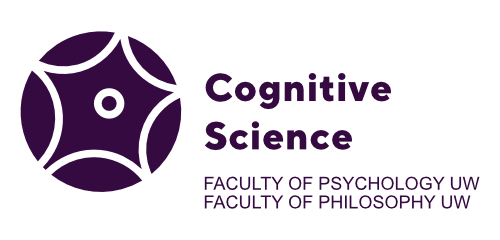STUDENTS
About the programme
The study programme is focusing on two thematic paths.
- Within the neurocognitive path, students gain in-depth theoretical and methodological knowledge of the cerebral basis of cognitive processes, the use of modern techniques for studying brain activity as well as planning and analyzing research while using them.
- As part of the computational path, students gain in-depth knowledge and skills in the basics and methods of modelling cognitive, language and social processes. Emphasis is put on the human behaviour and its products as well as on the cultural, environmental factors determining it.
Compulsory modules (26% ECTS) and the choice of one of two paths (13% ECTS) ensure the necessary minimum level of skills that a modern cognitive scientist should be equipped with. At the same time, there is a high level of flexibility and freedom in shaping students’ own course of study (over 50% of ECTS), which also allows interested students to fully or partially complete both paths.
A particularly important feature of the Cognitive Science programme is that students participate in the work of selected research teams and external companies form the R&D sector gaining practical experience in conducting research, applying adequate research methods and techniques and using new technologies. Another unique feature of the curriculum is the individual approach to every student which is garanteed by introducing a tutor from the first year. The tutor is to analyze student’s previous experience and to select appropriate „compensatory” courses, as well as other individual forms of activity (readings, Internet courses), which will allow those who are not graduated from the first-cycle studies in Cognitive Science to make up for possible shortcomings.
Programme outline
The studies consist of two stages (year 1, year 2). In order to complete each stage, the student must gain 60 ECTS credits. To obtain a master’s degree in cognitive science, the student must obtain 120 ECTS, write a thesis and defend it during a master’s exam. Five blocks of education modules have been planned in the programme:
- A block of introductory courses, the purpose of which is to update and expand basic knowledge of cognitive science with particular emphasis on both thematic paths. The courses in this block are obligatory and common for both paths, they are worth 31 ECTS credits.
- A block of „thematic paths”, consisting of methodological-practical modules, the purpose of which is to familiarize students with the methods used in a given discipline and their applications, as well as modules that deepen the knowledge of the theoretical foundations of these methods. The courses in this block are obligatory within the path chosen by the student. Students choose the path at the end of the first semester and „path” classes are worth 16 ECTS credits.
- A block of optional modules (35 ECTS credits) consists of elective courses created specifically for these studies, as well as of other courses offered at cooperating faculties / institutes. In addition – what is important – courses offered within one path can be counted as elective by students from the other path. This pool is also used to supplement any curriculum differences for students who are not graduates of first-cycle studies in Cognitive Science at the University of Warsaw. The choice of complementary courses is made by the student in cooperation with their tutor at the beginning of the first semester.
- A block of remaining courses, ie:
- Diploma seminar (four semesters: 1 + 3 + 4 + 4 = 12 ECTS): during the first semester potential supervisors present their workshops, projects, topics, and during the following semesters there are seminars in a given „path” (or in coherent thematic groups), during which the progress of students will be monitored and the research conducted in participating laboratories will be discussed.
- Research laboratory (from the second semester: 3 + 6 + 6 = 15 ECTS): participation in the work of the supervisor and their team, going beyond the student’s own research needed for the master’s thesis (developing methods, collecting data, analyzing results, possibly working in a supervisor’s wider research project); students during the first semester of the master’s seminar would find out what opportunities individual laboratories offer, what kind of activities they expect and what skills students will acquire in a given laboratory. Full involvement of students in the team’s work would start in the second year. In justified cases, with the consent of the head of the Cognitive Science programme and the master’s thesis supervisor, it is possible to participate in a research laboratory other than the one offered by the supervisor.
- Internships: during the third and/or fourth semester, minimum 90 hours for 5 ECTS credits. The internship may be of research nature (in projects other than those offered by the research laboratory chosen by the student) or take place at a company conducting work in which cognitive knowledge can be used. The introduction of internships into the study program is aimed at raising the qualifications of future graduates and their orientation on the labour market. The places of training are institutions where students can develop acquired knowledge and skills and learn about their practical application, such as companies in the area of new technologies, R&D departments, medical facilities using, for example, brain imaging methods. Internships can also take place in research teams (other than the research lab chosen by the student).
- General module block: general university courses (6 ECTS credits). This pool is also used to complete occupational health and safety classes and a course on intellectual property rights in case of students who did not complete similar courses during first-cycle studies.
